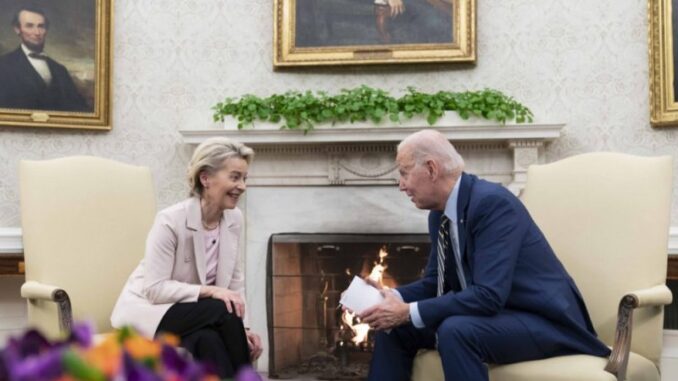
Brussels and Washington are close to greenlighting the launch of European navigation satellites from US territory this year to avoid service disruption, after two years of delay, Euractiv has learnt.
The bloc’s member states’ experts will examine a European Commission proposal as early as this Friday (1 March) with the aim of signing an international agreement to set security requirements for the Europeans to launch their navigation satellites from the US in the coming months.
Even if the US and EU are close to a deal, launching with a new provider and the capabilities of a third country has required lengthy deliberations and negotiations, starting in the summer of 2023.
It is currently unclear which Council formation – space, telecom or on inter-institutional issues – will sign off on the deal, and when.
Time is of the essence, however, after the EU’s latest batch of ‘European GPS’ satellites, were initially meant to go into space in the spring of 2022, to ensure the continuity of a navigation service used by billions of citizens and the military.
But Russia’s payback for EU sanctions has left the bloc unable to use its Soyuz rockets, and delays in the production of the EU-manufactured Ariane6 launcher left the European satellites stranded.
Brussels had no other options to organise a launch from the US after they estimated that the current constellation would no longer be safe after mid-2024, the text discussed by EU envoys read by Euractiv says.
The issue highlights the EU’s struggle to secure independent access to space, as the bloc seeks to become a bigger power in space, where major global players and competitors do not have to follow any rule.
“In view of ensuring the security of information included in Galileo satellites, a legally binding agreement with the United States is necessary to protect the integrity of the Galileo satellites on United States’ territory and the confidentiality of EU classified information,” the draft agreement text states.
Measures to ensure the security of the classified information carried by the satellites and of the equipment itself govern every aspect of the moving and use of the assets, the protection of the launch base, of European confidential information, and the satellite itself.
Drafted according to the non-binding international space law, the US and EU’s text also looks to regulate any dispute or liability of the EU and the US in case of an accident, and extraordinary access to EU confidential information.
The draft text shows the US will have to make sure the best security procedures are in place and follow strict requirements to avoid any tempering with the Commission’s sovereign assets and the confidential information herein.
The US will have to ensure the Commission that all security measures are in place before the satellites arrive on the base and bears the burden of investigating any breach.
For instance, American authorities will have to take “all necessary and appropriate measures to prevent damage, alteration, and tampering of Galileo satellites during the launch campaign beginning with their arrival on U.S. territory and ending with removal from US territory”.
That includes avoiding “any form of unauthorised entry, eavesdropping or other forms of interference with the activities taking place at the secure zones”.
Security measures will also be put in place to ensure the US “shall not access or inspect” the EU-protected assets related to the launch on a launch base – unless the protected zones must be assessed for safety, security, and environmental compliance.
The EU will also be allowed to add its security layer on top of the American one.
To add to the security of the equipment, it will be allowed to “post a guard 24/7 in or around the Secure Zones and continue monitoring the Secure Zones remotely via EU video systems”, in addition to the measures the US will have to put in place to protect the launch base “against any intrusion”, and the satellite itself.
To avoid any issues related to accountability in case of damage or incident (i.e. death, personal injury or health impairment, loss or damage of property), the text clearly plans that the EU would be liable.
In the event the Galileo satellite, or a part of it “causes damage giving rise to one or more claims for compensation made against the United States under international law (…) the US “may seek to substitute the European Union in place of the United States in whatever forum such a claim is brought”, the text states.
“If such substitution is not successful, the EU agrees to hold the United States harmless and indemnify the United States in relation to any financial obligation arising from the settlement or adjudication of such claims,” it adds.



